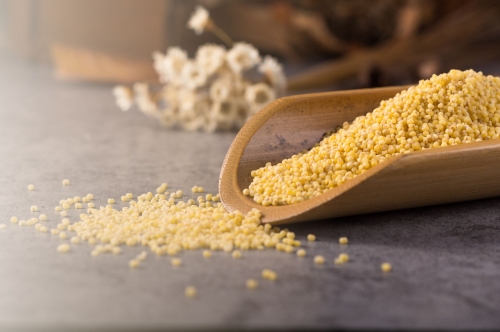Top 10 Natural Food Flavours | What they are

Readers can expect this article's comprehensive and engaging exploration of natural food flavours. The blog will delve into the fascinating world of these authentic taste enhancers, providing insights into their origins, extraction methods, and culinary applications. From the alluring aroma of fresh fruits to the savoury notes of herbs and spices, readers will discover the diverse sources of natural flavours and their role in elevating our dining experiences.
The article will also shed light on the health benefits of natural food flavours,
Throughout the article, readers will be inspired to appreciate the richness of natural food flavours and their positive impact on both taste and well-being. Whether professional chefs seeking to enhance their culinary creations or food enthusiasts looking to explore new taste sensations, this article promises to be a delightful and informative journey into the world of natural food flavours.
What are Natural Food Flavours?
Natural food flavours are organic compounds extracted from natural sources such as fruits, vegetables, herbs, spices, and other edible plants. These flavours are used to enhance the taste and aroma of various food and beverage products. Unlike artificial flavours, which are chemically synthesised in a laboratory, natural food flavours are derived directly from nature, capturing the authentic essence of the source material.
The extraction process involves careful preservation of the natural compounds that contribute to the characteristic taste and smell of the food. Natural food flavours are complex, offering a more genuine and true-to-nature experience than their synthetic counterparts. Natural food flavours are widely used in the food industry to improve the palatability of products, add depth to culinary creations, and create a more enjoyable and authentic dining experience for consumers. Additionally, the use of natural food flavours aligns with the growing consumer preference for natural and clean-label ingredients in their food choices.
Different Flavour Compounds
Flavour compounds are complex organic molecules responsible for the taste and aroma of various substances. They interact with taste receptors on our tongues and olfactory receptors in our noses to create a sensory experience. Different flavour compounds include:
- Esters: Responsible for fruity and sweet flavours.
- Aldehydes: Contribute to nutty, fruity, and buttery notes.
- Terpenes: Found in herbs and spices, providing citrusy and herbal flavours.
- Thiols: Contribute to the pungent and sulphurous aromas in some foods.
- Lactones: Provide creamy and coconut-like tastes.
- Phenols: Found in spices and herbs, creating smoky and spicy flavours.
- Pyrazines: Responsible for nutty and roasted aromas in foods like coffee and chocolate.
In varying combinations, these compounds create the wide range of flavours we experience in different foods and beverages.
What are the Different Types of Natural Food Flavours?
Different types of natural food flavours are derived from various natural sources and contribute to diverse taste experiences. Some common types include:
- Fruit Flavors: Extracted from fruits like strawberry, orange, and apple, offering sweet and tangy taste profiles.
- Herb Flavors: Derived from herbs like basil, mint, and rosemary, providing fresh and earthy notes.
- Spice Flavors: Obtained from spices such as cinnamon, ginger, and clove, adding warmth and complexity.
- Nut Flavors: Extracted from nuts like almond, hazelnut, and walnut, offering rich and nutty tastes.
- Citrus Flavors: Derived from citrus fruits like lemon, lime, and grapefruit, providing zesty and refreshing sensations.
- Savoury Flavors: Obtained from ingredients like garlic, onion, and mushroom, contributing to umami and savoury profiles.
- Floral Flavors: Derived from flowers such as lavender, jasmine, and hibiscus, offering delicate and aromatic notes.
These natural food flavours are widely used in the food and beverage industry to enhance taste and create enjoyable culinary experiences.
Check out our list of flavours.
Natural Food Flavours vs Artificial Flavours
Natural food flavours are derived from natural sources like fruits, herbs, and spices, capturing authentic taste profiles and offering a more genuine sensory experience. They are considered desirable by consumers due to their origin from nature and may have added nutritional benefits. In contrast, artificial flavours are chemically synthesised in a laboratory to mimic specific tastes and aromas. While they provide a wide range of flavours not found in nature, some consumers may perceive them as less authentic or less healthy. The choice between natural and artificial flavours depends on factors such as taste preference, cost, and consumer perception, with an increasing trend towards natural options for clean-label and health-conscious products.
Are Natural Food Flavours Safe to Consume?
Yes, natural food flavours are generally considered safe to consume. Natural food flavours are derived from edible sources found in nature, such as fruits, vegetables, herbs, and spices. They undergo rigorous testing and quality control to ensure they meet safety standards set by regulatory authorities, such as the Food and Drug Administration (FDA) in the United States or the European Food Safety Authority (EFSA) in Europe. These agencies evaluate the safety of natural flavours before approving their use in food products. As a result, natural flavours are considered safe for the general population when consumed as part of food and beverages.
Norex is a leading flavour manufacturing company that takes pride in providing the best natural food flavours to its clients. With a commitment to quality, innovation, and customer satisfaction, Norex offers a wide range of authentic and true-to-nature flavour profiles derived from fruits, herbs, spices, and other natural sources. Their team of flavour experts meticulously crafts each natural flavour, ensuring the preservation of the original essence while adhering to strict safety and regulatory standards. Norex's dedication to sustainable sourcing practices further underscores its commitment to delivering premium natural flavours, making them a preferred choice for companies seeking to enhance the taste and appeal of their food and beverage products.
Frequently Asked Questions
1) Is there a difference between flavours and natural flavours?
Yes, there is a difference between flavours and natural flavours. Flavours can be either natural or artificial, with artificial flavours chemically synthesised. On the other hand, natural flavours are derived from natural sources like fruits, vegetables, and herbs, providing an authentic taste experience.
2) What are the most common natural food flavours?
The most common natural food flavours include fruit flavours (e.g., strawberry, orange), herb flavours (e.g., basil, mint), spice flavours (e.g., cinnamon, ginger), citrus flavours (e.g., lemon, lime), and nut flavours (e.g., almond, hazelnut). These natural flavours are widely used to enhance the taste of various food and beverage products.
3) Does coffee contain natural food flavours?
Yes, coffee contains natural food flavours. The taste and aroma of coffee come from various compounds naturally present in coffee beans, including acids, sugars, and oils. These compounds contribute to different coffee varieties and roasts' distinct flavours and aroma profiles.












